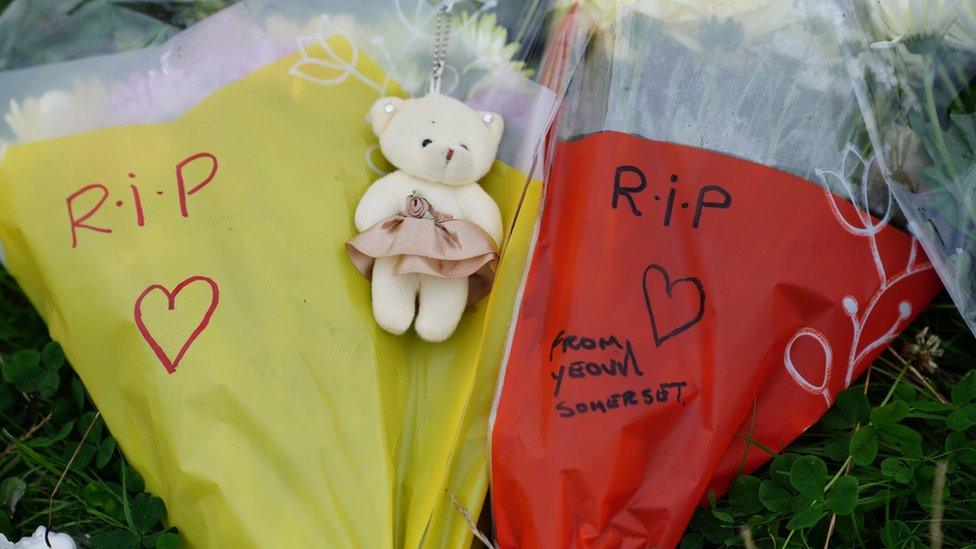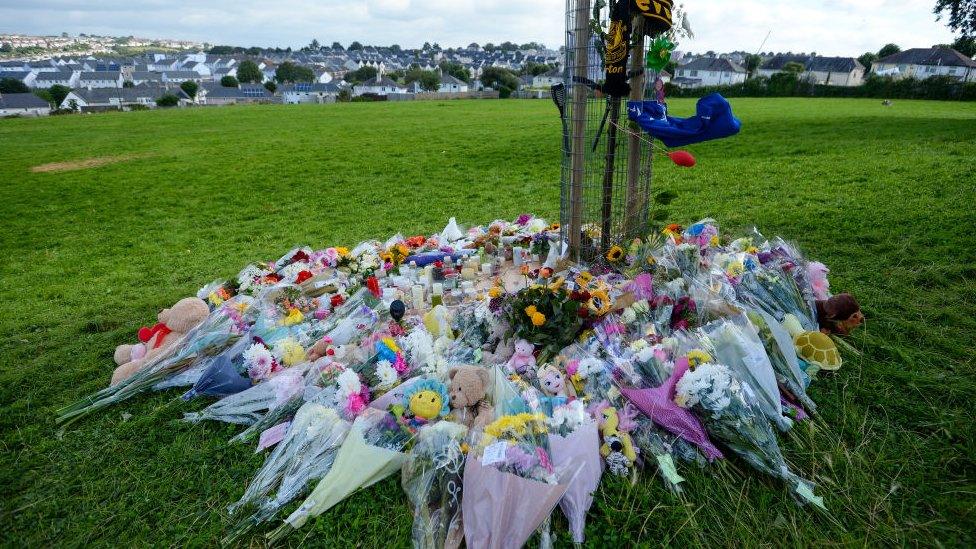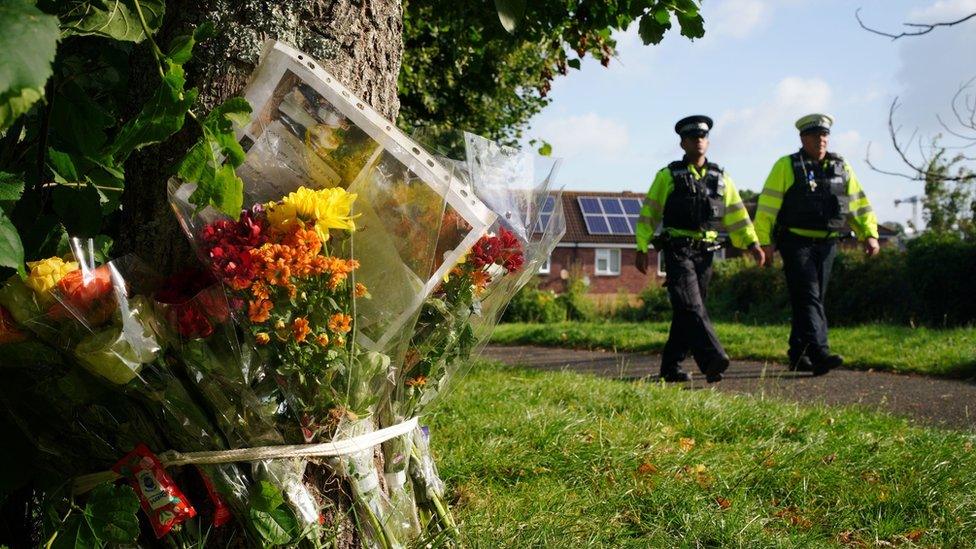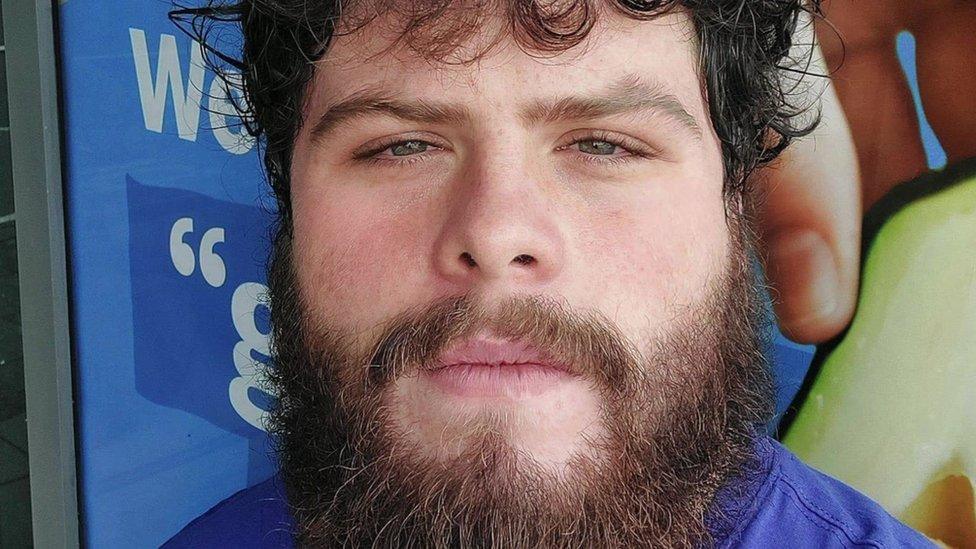Charity's concern over guns being returned to abuse suspects
- Published

The government is still considering its response to a coroner's recommendations in wake of the Plymouth shootings
A domestic abuse charity says it shares a police chief's concerns over the number of people who have guns returned to them on appeal.
First Light called for the licensing system to be strengthened in the wake of the inquest into the shootings in Plymouth.
Jake Davison, 22, used a legally-held shotgun to kill five people in 2021.
The government is still considering its response to a coroner's recommendations.
Davison killed his mother Maxine Davison, 51, and four others before shooting himself in the Keyham area of the city.
Three-year-old Sophie Martyn, her father, Lee, 43, Stephen Washington, 59, and Kate Shepherd, 66, were all killed.

Maxine Davison, Sophie and Lee Martyn, Kate Shepherd and Stephen Washington were killed in August 2021
In a prevention of future deaths report, external, senior coroner Ian Arrow referred to evidence, heard at the inquest, showing that half of all decisions by Devon and Cornwall Police to revoke or not grant a licence were overturned in a crown court.
The coroner also referred to the case of a man given his gun licence back after it was revoked by the force due to concerns about domestic abuse and suicide.
A court gave the man his gun back in December 2022 despite the man being arrested for drink-driving and assaulting police, Mr Arrow said.
The inquest heard the judicial system "set a high threshold for revocation".
'Safe and robust'
Mel Francis, director of domestic abuse services at First Light, which helps victims in Devon, Cornwall and Wiltshire, said: "To be able to be given a gun licence back and to be given their gun back is really concerning.
"The law has to be really clear… there has to be a really safe and robust system when you're looking at gun licences."
Sir Ian Burnett, Lord Chief Justice of England and Wales, in his reply to the coroner earlier this month, external, said his office had been "unable to discover what proportion of chief constable revocations (running at about 1,000 per annum) are subject to appeal or the success rate".
Lord Burnett added: "If judges were approaching cases incorrectly…it would be reasonable to assume there would be appeals [by the police]…this is simply not happening in practice."

Analysis: Ben Woolvin, BBC Spotlight Home Affairs Correspondent
The courts had no involvement in the decision to return Jake Davison's gun shorty before the Plymouth shootings - the inquest jury found that was the result of "catastrophic police failings".
But the coroner also heard how current gun law may have contributed to a culture in the Devon and Cornwall gun licensing department of defaulting to granting gun certificates.
Some police staff told the jury they felt there was little point in asking difficult questions, or taking guns away, because of the way the current law works.
No case is straightforward - in the separate domestic abuse case presented to the inquest the judge was told the incident was a one-off, but when it comes to gun licensing many of those who work with the victims of domestic abuse say there cannot be any second chances.

In his submission to the inquest, Will Kerr, chief constable for Devon and Cornwall Police, said: "The root of the problem is with the legislation and the guidance, and they cannot be separated."
Mr Kerr said the legislation stated firearm certificates "shall be granted" unless certain requirements were not met.
"That approach is at odds with public safety and the mantra that owning a gun is a privilege and not a right," he said.
"The legislation should say that a certificate 'shall not be granted' unless the applicant has satisfied the police he is safe to hold a gun."

Floral tributes were laid following the shootings in Plymouth in August 2021
The Home Office said "the UK has some of the strictest gun laws in the world".
A spokesman said: "Since the tragedy in Plymouth, the government has already taken steps to tighten firearms licensing including introducing Statutory Guidance for the police, and requiring that applications will only be considered if they include medical information from the applicant's GP.
"We thank the senior coroner in Plymouth for his Prevention of Future Deaths reports. We are carefully considering the findings and expect to respond shortly."
Its response is currently due by 30 June, after a further extension was granted.

Follow BBC News South West on Twitter, external, Facebook, external and Instagram, external. Send your story ideas to spotlight@bbc.co.uk.
Related topics
- Published18 May 2023

- Published16 May 2023

- Published12 May 2023

- Published10 March 2023

- Published21 February 2023
